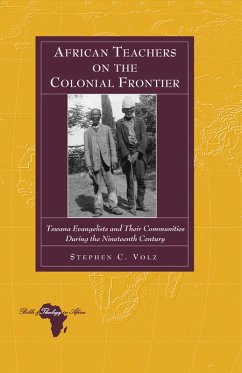African Teachers on the Colonial Frontier is an exploration of the profound social and personal changes that accompanied the expansion of European influence in the interior of southern Africa during the nineteenth century, focusing on the role played by Tswana Christian evangelists. Drawing on a wide range of sources and locating African converts rather than European missionaries at the center of the story, this book provides new insights into the development of African-European relations and the impact of colonization. Although Christian missions played an important role in European expansion, this book reveals that during much of the nineteenth century, Europeans had little control over the various ways that Africans interpreted, assimilated, and propagated Christianity, and how Christianity acquired meanings contrary to its presumed role as a vehicle for European imperialism. Africans associated Christianity with Europeans, but the implications of that association changed as relations between Africans and Europeans changed. More influential was the association of Christianity with certain individuals or families and their employment of Christianity as an element of politico-religious authority. Africans transformed Christianity as they were themselves transformed by it, and their efforts were usually motivated by very personal or local concerns, often despite - rather than because of - Christianity's association with foreigners.
Given its broad chronological scope and accessible prose, this book will be useful to undergraduate students studying the history of Africa, religion, or colonialism. The book's detailed references to specific people and places in southern Africa also make it of interest to students and other readers residing in that region with an interest in the history of their churches or particular communities.
Given its broad chronological scope and accessible prose, this book will be useful to undergraduate students studying the history of Africa, religion, or colonialism. The book's detailed references to specific people and places in southern Africa also make it of interest to students and other readers residing in that region with an interest in the history of their churches or particular communities.
Dieser Download kann aus rechtlichen Gründen nur mit Rechnungsadresse in A, B, BG, CY, CZ, D, DK, EW, E, FIN, F, GR, HR, H, IRL, I, LT, L, LR, M, NL, PL, P, R, S, SLO, SK ausgeliefert werden.
«This is an excellent study. Few young scholars have done so much work in so many languages, presented their findings in such fluent, engaging prose, and done so in such a way as to greatly enrich our understanding of one of the most dramatic events in modern cultural history: the Christianization of sub-Saharan Africa.»
(Richard Elphick, IJAHS Vol.49, No.3 2016)
(Richard Elphick, IJAHS Vol.49, No.3 2016)


